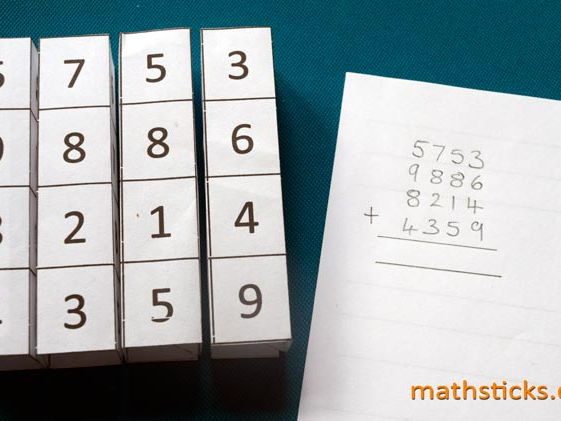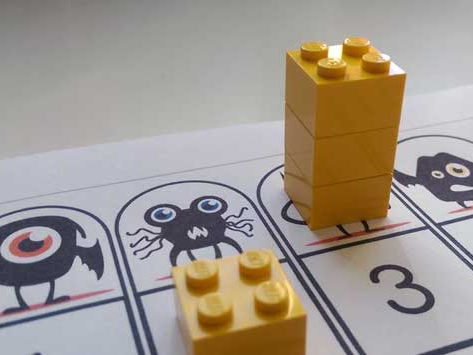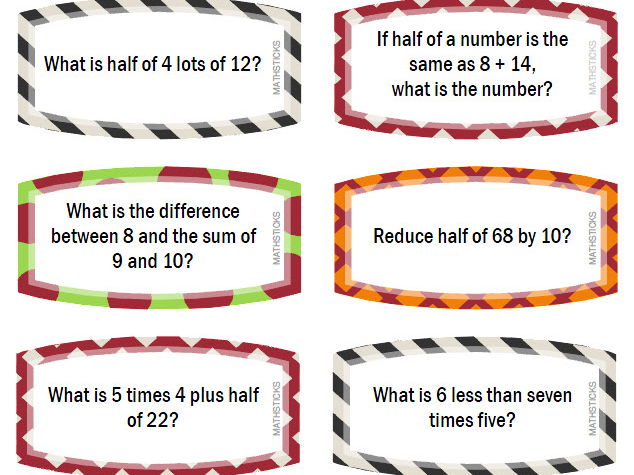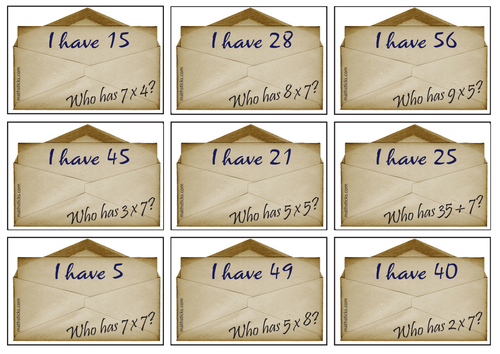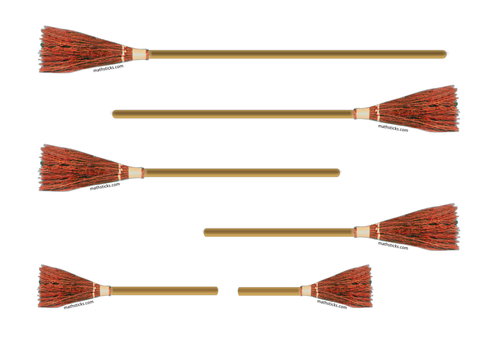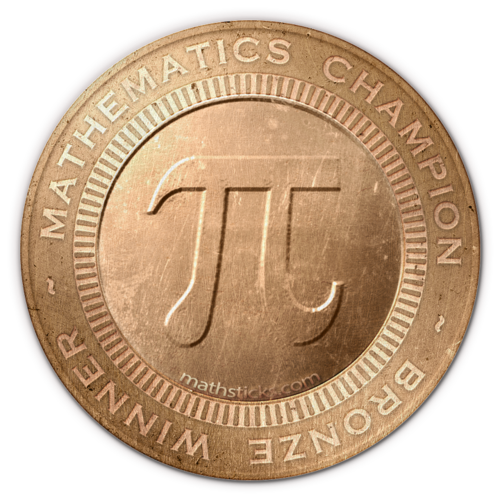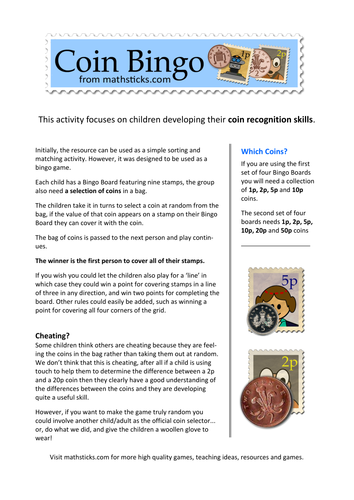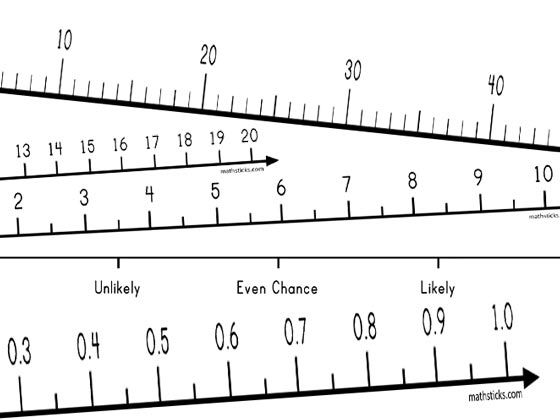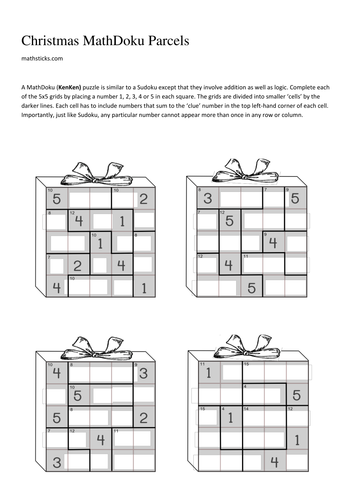
44Uploads
227k+Views
69k+Downloads
All resources

Teaching Roman Numerals
This 53 page eBook is is a full discourse on how to teach Roman Numerals (properly)
The book includes mathsticks unique “Five Stages of Teaching Roman Numerals” together with a bumper collection of information sheets, posters and assessment materials for teaching Roman Numerals.
If you are teaching about Roman Numerals – you will do it 100 times better with this eBook!

Maths-Magic Instant Addition
This is more than just an assembly... it's a maths activity that will inspire and entertain. You can also use it as a superb introduction to some great mathematical reasoning for Key Stage 2 or 3.
The downloadable booklet will enable you to instant demonstrate some truly baffling mathematical magic addition.
Imagine hearing this:
3769 + 7972 + 4386 + 8257
…and instantly knowing the answer.
You use a selection of *Squashy Boxes* to create a series of random numbers. Your audience can use a calculator to add the numbers together, or work on paper… it doesn’t matter what they use – you already have the answer!
In fact you can write the answer down the instant you see (or hear) the four random numbers!
The download is a beautifully illustrated, 7-page file detailing the complete workings of the ‘trick’. The file includes all of the resources you need and a number of additional ideas and tips.
The magic trickery can easily be adapted so you can perform the same mathematical-magic with 2-digit or 3-digit numbers too.

16 Dice Games for KS1 & KS2
Here are 16 of our favourite dice games in a 41 page eBook. The maths games focus on addition, subtraction and multiplication for both KS1 and KS2 children. Most of the games have beautifully designed game boards (some have multiple versions of the boards) together with clear instructions and additional ideas for further adaptation and development.

Monster Towers - Calculation Game
A creative way to involve your children in problem solving while using addition, subtraction, multiplication and division.
Monster Towers uses a fun, monster-themed, game-board, 3 dice and a collection of counters. The game is to build towers by creating calculations which match the Monster's numbers.
This is an eight page download with detailed playing instructions and 4 different playing boards (you will need your own counters, dice and children).

100 Multi-step Problems for Y2/Y3
The 6 page pdf file contains 100 two-step problems, such as:
Subtract 12 from the product of 7 and 2
Double the difference between 28 and 41
Multiply a fifth of 20 by 10
Five times a number has the same value as 28 + 17. What is the number?
This maths activity focused on helping children to work out what to do when faced with a two-step problem.
Working with thinking partners, each child has a problem card.
They take it in turns to read it out and discuss how it could be attacked; discussing what maths functions they need to apply in order to solve the problem. Importantly, they must also decide on the order of those functions and be prepared to explain everything to each other.
The focus (as with most mathsticks resources) is very much on the maths talk.
This is a very useful activity for either the introductory or plenary phase of a lesson with children working together on mini whiteboards.
The maths problems could also be used as part of group activity. Naturally, the focus is on the mathematical talk and the decisions the children make regarding the problem rather than on the actual “answer”.
The problems here could easily be adapted or enhanced. In a following session the children could be asked to create their own problems, using these as a template, but focusing on specific concepts: subtraction and percentages, for example.
10 pages with 10 problems each - print, cut out, laminate, use and re-use.
If you use this, please rate the resource so others can find it, and post a comment to let me know how it worked for you.

Clay Number Formation Mats
This early number recognition resource will help children to form, write and explore numbers from 1-10. The download includes 41 pages of different mats with high quality, realistic Clay Number images. These are designed to help children to form numbers by finger-tracing or forming clay/dough or Plasticine over the ‘number shape’. The mats also include sections for the children to work with ‘one more’ and ‘one less’, write numerals, link numbers to quantities and use ‘Tens Frames’.
Print the ones you want, laminate (or place in pocket files) and re-use as often as necessary.

72 Mixed Calculation Challenges for Key Stage 2/3
These quick maths challenges enable children to get quickly into a mathematical frame of mind at the very start of the session. There are 72 short, self contained challenges featuring all four functions. 12 sets of differentiated 'cards' enable children to access the work at their own level.
Importantly, unlike some Challenge on Arrival tasks, marking is negligible with these. It is also very easy to explain what to do, but the tasks are varied and interesting.
The challenges can also provide assessment opportunities and initial ‘talking points’ once the session starts.

George's Mathematical Medicine
The Mathematics Medicine booklet consists of 8 pages of maths problems suitable for Year 3 children.
The booklet uses the idea of a weird ‘medicine’ recipe from Roald Dahl’s George’s Marvellous Medicine.
In this maths resource, George’s teacher has designed his own weird medicine and the ingredients are all hidden inside this book of problems.
The children are presented with a series of problems and puzzles, each of which is based on a calculation skill linked to the National Curriculum.
As they solve the problems they will reveal the strange ingredient’s in their teachers recipe.
Have fun.
Note - this works best when printed as an A5 (folding) booklet - there are instructions on the pdf for this.
Alos see mathsticks.com for more information.
Please rate!

Follow Me 7x and 5x tables
Not your usual 'Follow Me&' cards! These are top quality images to really engage your children. The activity/game works in the usual way, but the resource itself is second to none (think 'Marks & Spencers'). Give it a go - quality resources = quality learning!

Broomstick Measurement
A Halloween themed measuring activity/game. The children can use the broomstick images as non-standard units for measuring items, or estimate and then measure each broomstick in cm. Full activity details on the mathsticks.com website.

Maths Reward Medals
Gold, Silver and Bronze 'Maths Champion&' medals - perfect as reward stickers, either for a wall display; or for children to wear, stick in their books or take home.

Roman Number Bingo
A set of 20 Bingo Boards featuring Roman Numerals together with calling cards.
A fun way to help children reinforce how Roman Numerals are written.
Great group activity, or can be used with whole class. If you find this useful please comment.

Take Away
A simple board game for two players to reinforce number bonds to 10. Ideal partner activity or as a fun homework 'task'. If you find this useful please comment. Cheers.

Coin Values - Coin Recognition
One of our favourite resources - high quality images make this a very engaging game. The children have to match 1p, 2p, 5p, 10p 20p and 50p coin values to the prices on stamps. Can be used as an assessment activity or as a full-blown bingo game. Take a look at it, I'm sure you and your children will love this. Please rate it and let me know how it works out for you.

Problem Talk
A set of 20 multi-step written problems, designed to offer appropriate challenge for Y2 and Y3 children.
An excellent activity when children work together on mini whiteboards. The focus is on 'mathematical talk' and the decisions the children make.
Print the file and cut into strips - each containing one problem. Give each child a slip, and ask them to take turns to read their problem and discuss how it could be attacked. Encourage them to explain what mathematical functions they think they need in order to solve the problem, and to decide on the order of those functions.

Black Master Number Lines
A collection of 8 Mini desk-sized number lines useful for KS1 and KS2. These are simple, plain number lines suitable for one-to-one work or demonstrations. The set includes five of each of the following: 0-10, 1-10, 1-10 with halves, 0-20, 1-20, 0-100, and -10 to +10 in both horizontal and vertical format. See mathsticks.com for images. They have been very popular in many classrooms, particularly the -10 to +10 ones. Please rate and comment. Thanks.

Place Value Sheets - Christmas Labels
Children have to identify numbers from the Christmas labels and select them from a list. A useful assessment activity.

Sums to 15
The pdf file contains three grids of numbers. The children have to find a line of three numbers that total 15. Numbers are not used twice, and correct answers will form a symmetrical pattern. If the handouts are laminated the children can work together wi

Christmas MathDoku
Here are four MathDoku, or KenKen type puzzles. We've simplified the more traditional version so that this only includes addition. The idea is for the children to work in pairs to complete each 5x5 grid, following the simple rules: - the numbers entered into each 'cell' (squares marked out by darker lines) should total the clue number in the top left-hand corner; - only the numbers 1, 2, 3, 4 and 5 are used; - like Sudoku, numbers only appear on each row or column once. The worksheet here includes four KenKen puzzles (together with answers).

Shape Taboo Game
27 cards featuring shape related words. The game is for two players, a 'reader' and a 'guesser' The object of the game is for the 'reader' to help his/her partner to identify the correct vocabulary word on the card by describing th


